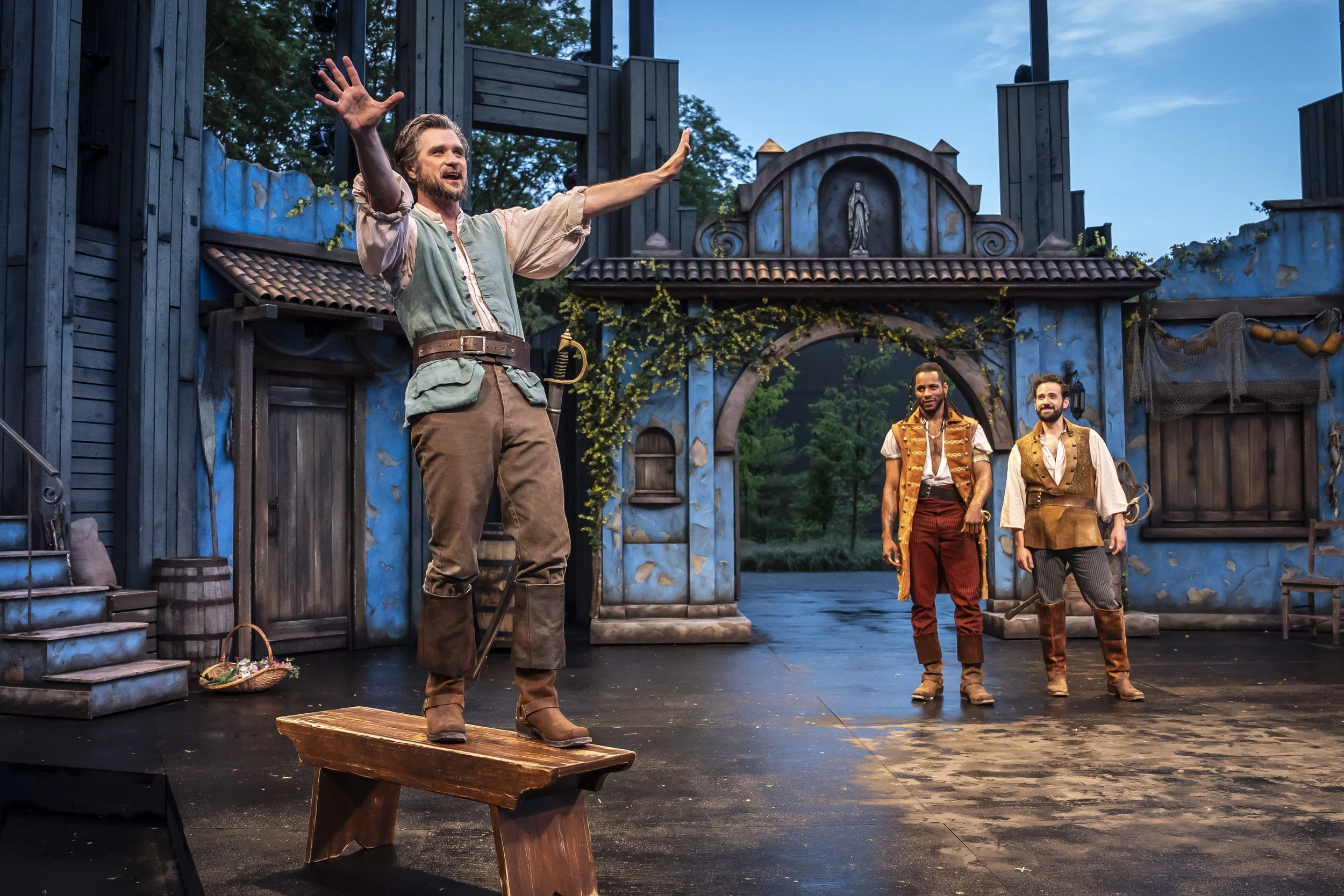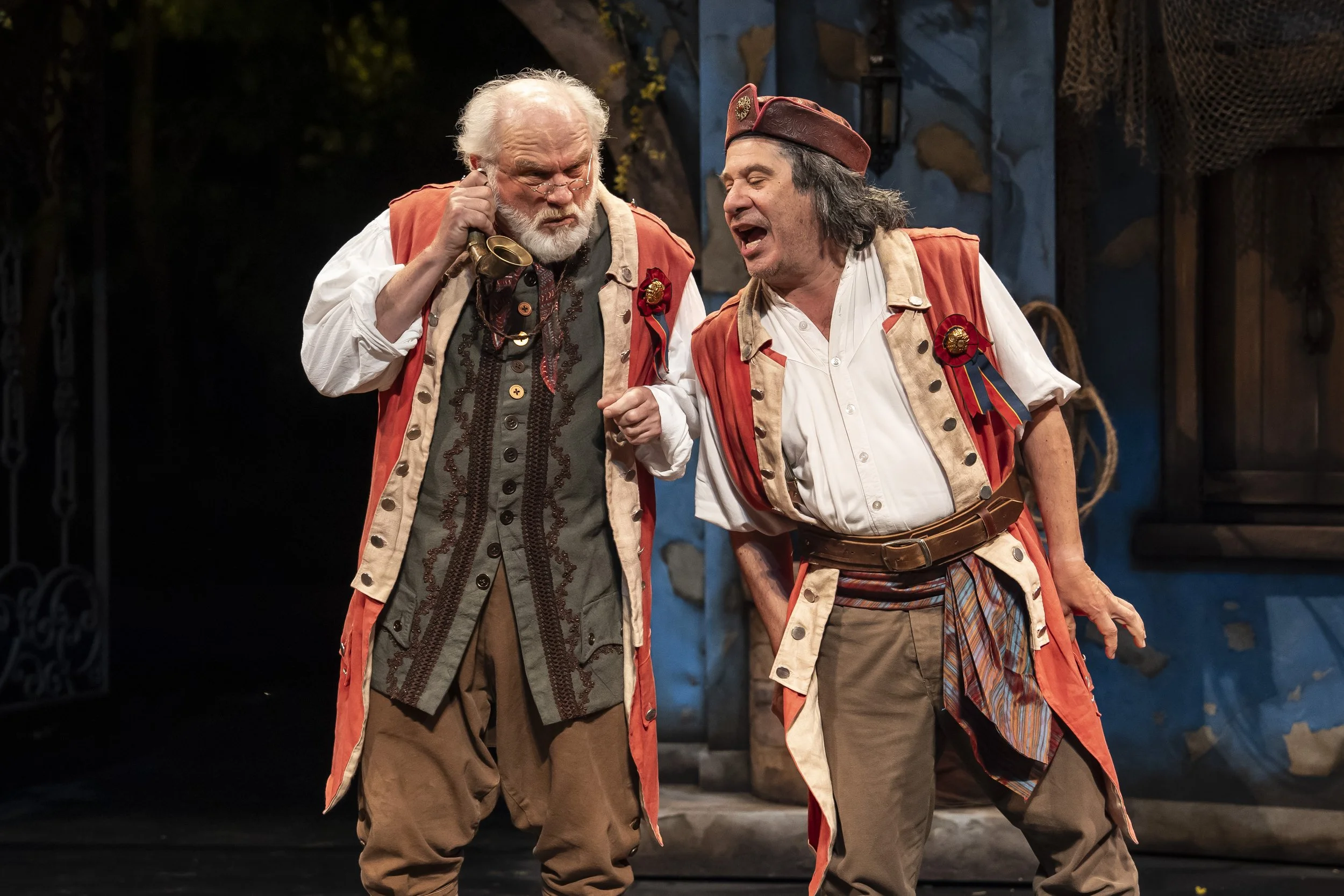"All Mirth and No Matter,” APT’s Festive Production Captures the Merriment of Much Ado About Nothing
Beatrice and Benedick, squaring off. Photo by Liz Lauren.
I blame Shakespeare’s finest, wittiest, most satisfying comedy, Much Ado About Nothing, for my dating woes as a young person. Reading the play in college, (long before I saw productions at American Players Theatre in 1992, 1999, 2007 and 2014) I discovered the truly indomitable character of Beatrice – a wise-cracking, provocative, yet tenderhearted woman who was sometimes too sharp-tongued for her own good. She courted through verbal combat and confessed to loving a scoundrel in spite of herself. Using Beatrice and Benedick’s sparring as a roadmap to romance, I am certain that I confused and repelled more suitors than I charmed. But with each potential match that fizzled, I became more and more determined to find my Benedick. Their exchanges were so smart, so playful and so electric. Watching the mounting tension between them eventually translate into passion was thrilling – the pay-off could not have been greater.
In American Players Theatre’s current production of this delightful comedy, playfully directed by Robert Ramirez and running in the Hill Theatre through September 29, there is much dancing, merry-making and frivolity. This starts with the opening celebration of Don Pedro (a princely Rasell Holt) and his soldiers returning from a victorious campaign, to the open arms of the Governor of Messina, Leonato (a magnanimous Jim Ridge). As soon as the prince and his soldiers have entered the estate, Leonoto’s mischievous niece Beatrice cannot resist launching some jolly taunts at her favorite target, the rascal Benedick.
Photo by Liz Lauren.
Jessica Ko gives Beatrice a mighty backbone and plays the heroine with smarts and sass. She happily volleys verbally with anyone who will play, from the prince, to her uncle, to her withering opponent “Signior Mountanto.” Ko is equally good at physical comedy, playing hide-and-seek with a line of laundry as she hears reports of Benedick’s love for her, in amazement. Unfortunately, her strong armor succeeds too well when the actress is asked to show vulnerability. While weeping for her cousin’s ruined marriage ceremony and unfounded accusations of wantonness, she can’t quite reveal Beatrice’s unguarded heart. Instead Ko plays the scene for laughs.
Photo by Liz Lauren.
As her partner in unpeaceable wooing, Marcus Truschinski is divine as a slightly grizzled Benedick, who is annoyed first by his friend Claudio’s interest in marriage, and then his own. The versatile actor is equally good as the confirmed bachelor and the unpracticed lover, navigating a whole new world, which includes softness, sincerity, and honor. Truschinski makes comedy look easy, arranging inflections to make centuries-old lines sound new. His efforts to hide while he overhears his friends discuss Beatrice’s undying love for him are as clever as they are corny. The result is pure hilarity.
Photo by Liz Lauren.
As mentioned above, comedy is hard. This theater maxim is sharply illustrated by the band of hopeless bumpkins that make up Dogberry’s woefully inept watch. The harder the group tries to infuse their silly soldiers with gags, the more difficult it is for the audience to find them amusing. The one bright spot in the bumbling band is Sam White, a Madison actor taking his first turn on the boards at APT, committed to his ear trumpet and misunderstanding of most of the dialogue. He is a perfect for foil to the visiting soldiers and their glorious battlefield deeds.
Nice shorts. Photo by Liz Lauren.
Jim Ridge has a long history of portraying fathers at APT, and in Shakespearean plays, those characters often have complicated and uncomfortable relationships with their children. Much as he did playing Capulet in APT’s Romeo and Juliet in 2014, in Much Ado he has the unenviable task of appearing to love his daughter completely, and then cursing her an instant later, wishing she was dead. Ridge leads the audience through this 360° turn of emotions surprisingly smoothly, modulating lines that can sound cruel, if not bizarre to modern audiences. Ridge’s comic chops are also on full display as he plays a scene for Benedick to overhear, planting the seed of Beatrice’s love in his mind.
Hero (an upright Samantha Newcomb), the greatly wronged innocent of the story, is underwritten and often portrayed as one-dimensional. So it is a great relief in this production to see her stand up for herself, argue with her father, and protest the slander that has been hurled at her without saying a word. Through her posture and expressions Newcomb creates an ingenue with a brain and a heart, and perhaps a bit of stubbornness she learned from her cousin.
Don John, the bastard, half brother of the prince, is also underwritten and often underdeveloped onstage. Frequently he is played only as a miscreant misanthrope. But like Hero, in this production the character is imbued with complexity. Actor Casey Hoekstra approaches the sour ne’er-do-well with the intelligence and inner life that he would any other character. With these added layers of texture, Hoekstra does not make Don Jon sympathetic, but he is enormously more interesting. He is suddenly a three-dimensional human rather than a plot device.
Also inserting lots of personality into a somewhat stiff role, Russell Holt makes the prince his own, bringing a healthy dose of swagger and cynicism to the dashing figure. Attired in large leather boots, a fine shirt open to the waist and a sword by his side, it is easy to see how soldiers would follow him into battle.
The scenic design by Josafath Reynoso and sound design/original music by Sartje Pickett set the play solidly in the seaside Italian town of Messina. Fishermen’s nets and floats decorate the walls, which are aqua blue and peeling around the edges. The sound of ocean waves starts the show and are inserted periodically, underlining the drama inherent in this locale. It is an environment that is a little too salty, a little too sunny, where the opposites land and shore meet with a crash, and solid rock – like stubbornness – is worn away bit by bit over time.
Unfortunately Daniele Tyler Mathews’ costume design undermines the specificity of the setting with clothing that is a mishmash of places and times. When the prince’s regiment arrives at the top of the show they disembark their ship wearing costumes that veer towards pirates. Later, inexplicably, the soldiers don modern khaki shorts for a silly scene that looks wildly anachronistic. And while I enjoyed the beautiful mantillas the women wore for the final wedding scene, they read very traditionally Spanish instead of Italian.
But none of these criticisms can take away the sheer joy of watching one of Shakespeare’s best couples come together, who are much too wise to woo peaceably. Beginning and ending with exuberant dances choreographed by Brian Cowing, this production is a treat to see under the stars.
Re: happy endings – When I wrote my online dating profile in the early aughts, I titled it “Beatrice looking for Benedick.” After corresponding and meeting with a harrowing 33 different candidates for the role, I finally found him. We have been happily sparring and “suffering love” for each other for almost 20 years.






